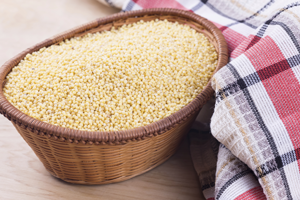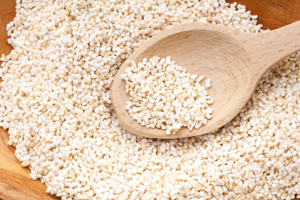May is Celiac Disease Awareness Month. As the gluten free diet becomes increasingly common, alternatives to wheat are now more accessible in grocery and health food stores. Take a look at the following grains, seeds, and flours that are healthy substitutes to wheat-based foods:
Teff. Native to Ethiopia, teff is a gluten free whole grain that you can find served as bread in Ethiopian restaurants. You can also prepare teff as polenta or porridge. It contains plenty of iron, fiber, protein, and B vitamins.
Amaranth. Once a major food crop of the Aztecs, this grain is an excellent source of lysine and methionine — two essential amino acids. In addition, it is high in Vitamin E, calcium, and protein. Try adding amaranth to flour blends, soups, and stews to boost their nutritional value.
Never Miss a Beat!
Subscribe to Our HealthBeat Newsletter!
Thank you for subscribing!
You can now select the specific newsletters you'd like to receive.
You are already subscribed.
Subscribe to more newsletters in our email preference center.
Sorry, an error occurred. Please try again later.
Get Healthy Tips Sent to Your Phone!
Buckwheat. Despite its name, buckwheat is actually a fruit seed. An excellent plant source of protein, you can prepare the buckwheat “groats” as a hearty porridge. Buckwheat flour can be used to make noodles, cookies, cakes, or granola.
Millet. An ancient seed, millet is high in phosphorus, potassium, and manganese. You can cook the millet kernels similarly to rice or as a breakfast cereal. Millet is considered “alkaline”, making it easy digest.

Almond flour. Made from ground blanched almonds, this flour is high in monounsaturated fats — which may decrease the risk of heart disease. Rich in vitamin E, fiber, and protein, almond flour is also low in carbohydrates. You will commonly find almond flour used in dessert and cookie recipes.

Have you tried any of these? What gluten free foods do you enjoy the most?
About Digestive Disorders
UPMC Digestive Health Care cares for a wide range of gastrointestinal (GI) conditions and diseases, from diagnosis to treatment. Whether your digestive condition is common or complicated, our experts can help. Upon referral from your physician, we coordinate your testing and treatment. If you have a complicated condition, we can refer you to one of UPMC’s digestive health centers of excellence. Find a GI doctor near you.


